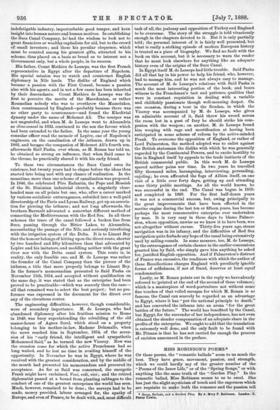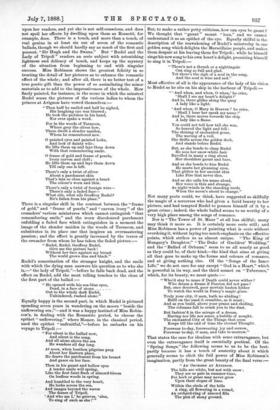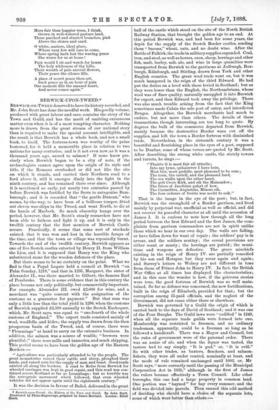MISS ROBINSON'S POEMS.*
OF these poems, the "romantic ballads" seem to us much the best. They have grace, movement, passion, and strength, which we could hardly say of the greater number of the "Poems of the Inner Life," or of the "Spring Songs," or with anything like the same truth of the "Garden Play." In the romantic ballad, Miss Robinson seems to us to excel. She has just the slight mysticism of touch and the eagerness which are requisite to make both the romance and the passion tell
• Songs, Banads, and a Garden Play. By A. Mary F. Robinson. London : T. Tuber Malvin.
upon her readers, and yet she is not self-conscious, and does not spoil her effects by dwelling upon them as Rossetti, for example, does. There is a touch, and more than a touch, of real genius in at least six out of seven of the romantic ballads, though we should hardly say as much of the first and poorest, "Sir Hugh and the Swans." But "Rude! and the Lady of Tripoli" renders an eerie subject with astonishing lightness and delicacy of touch, and keeps up the mystery of the situation from beginning to end with singular success. Miss Robinson shows the greatest felicity in so treating the detail of her pictures as to enhance the romantic effect of the whole; and after all, there is no better test of a true poetic gift than the power of so assimilating the minor materials as to add to the impressiveness of the whole. How finely painted, for instance, is the scene in which the minstrel Rude! scans the pictures of the various ladies to whom the princes at Avignon have vowed themselves :—
"Then half he smiled and half he sighed, His laughing eye was blurred; He took the pictures in his hand, Nor ever spake a word.
For in the woods of Tarascon, Where grey the olives bow, There dwelt a slender maiden, Whom he remembered now.
0 painted eyes and painted locks, And look of dainty wile ; He lifts them up and lays them down With that remembering smile.
0 frame of gold and frame of pearls, Ivory -6.arven and cleft ;
He lifts them up and lays them down Till only one is left.
There's only a twist of silver About a parchment skin That's lain so close against a heart The colour's worn and thin.
There's only a twist of foreign wire— There's only a faded face—
What ails, what ails Geoffrey Rudel? He's fallen from his place.
There is a singular skill in the contrast between the "frame of gold," and "frame of pearls," and " carven ivory" of the crusaders' various miniatures which cannot extinguish "that remembering smile," and the worn discoloured parchment enfolding a faded face which extinguishes in a moment the image of the slender maiden in the woods of Tara,scon, and substitutes in its place one that inspires an overmastering
passion ; and the effect is greatly increased by the terror of the crusader from whom he has taken the faded picture:- "Rudel, Rudel, Geoffrey Rudel,
Give me the picture back !
Without her face against my breast The world grows dim and black." • Ruders assassination of the stranger knight, and the smile with which the dying man answers his question as to who she is,—" the lady of Tripoli,"—before he falls back dead, and the effect on Rudel, add the most telling touches to the close of the first part of the ballad :—
"He opened wide his sea-blue eyes,
Dead, in a face of stone Out to the windy dark Rudel, Unhindered, rushed alone."
Equally happy is the second part, in which Rudel is pictured spending seven years in wandering on the moors "beside the
unflowering sea ;"—and it was a happy instinct of Miss Robin- son's, in dealing with the Romantic period, to choose the epithet " unflowering," where Homer, in the classical period, used the epithet "unfruitful,"—before he embarks on his voyage to Tripoli :—
" For silent is the ballad now, And silent is the song, And all alone above the sea He wanders all day long.
At noon, when heathen pilgrims pray.
About her Eastern place, He draws the parchment from his breast
And gazes on her face.
Then in his gaunt and hollow eyes A tender smile will spring, Like the first faint flush of almond-bloom On leafless woods in spring.
And humbled to the very heart, He looks across the sea, And images beyond the waves The domes of Tripoli.
And who am L' he grieves, alas, To sing of such as she !' "
But, to make a rather petty criticism, how can eyes be gaunt ? We thought that " gaunt " meant "lean," and we cannot understand it as an epithet of the eye. Equally skilful is the description of the reawakening of Ruders minstrelsy in one golden song which delights the Marseillaise people, and makes them despair at his leaving them for Tripoli ; while he himself sings his new song to his own heart's delight, promising himself to sing it in Tripoli:—
" There's not a thrush or a nightingale Can sing so full and glad.
Yet there's the sigh of a soul in the song, And the soul is wise and sad."
Most effective of all is the appearance of the lady of his vision. to Rude! as he sits on his ship in the harbour of Tripoli :—
" And when, and when, 0 when,' he cries, Shall I see my heart's delight?' And lo, there glides along the quay A lady like a light.
'And when, 0 Mary in Heaven !' he cries, Shall I hear her speak my name ?' And lo, there moves towards the ship A lady like a flame.
You could not tell how tall she was, So heaved the light and fell : The shining of enchanted gems, The waving of a veil, She drifts across the golden deck, And stands before Rudel.
But, as she bends to clasp Rudel He sees her snow-white hair Ravelled in many a ring about Her shoulders gaunt and bare.
And as she bends to kiss Rude!
He meets her gleaming eyes, That glitter in her ancient skin Like Fire that never dies.
And as she calls his name aloud, Her voice is thin and strange, As night-winds in the standing reeds When the moon's about to change."
Not many poets could, we think, have suggested so skilfully the magic of a sorceress who had given a lurid beauty to her picture, and had tempted Rudel to possess himself of it by a great crime ; indeed, the whole ballad seems to us worthy of a very high place among the songs of romance.
Nor is "The Tower of St. Maur" at all less skilful ; many may think it more so. It is certainly more eerie still ; and Miss Robinson has a power of painting what is eerie without overdoing it, without laying too much emphasis on the effective points, which strikes us as almost unique. "The King of Hungary's Daughter," 'The Duke of Gueldres' Wedding," and the "Ballad of Orleans," seem to us all nearly as good as they could be, of their kind,—the kind that aims at giving all that goes to make up the forms and colours of romance, and at giving nothing else. Of the "Songs of the Inner Life," we do not care for any except "God in &Heart," which is powerful in its way, and the third sonnet on "Tuberoses," which, for its beauty, we must quote :—
" Who'd stay to muse if Death could never wither? Who dream a dream if Passion did not pass ? But, once deceived, poor mortals hasten hither To watch the world in Fancy's magic glass.
Truly your city, 0 men, hath no abiding !
Built on the sand it crumbles, as it must ; And as you build, above your praise and chiding, The columns fall to crush you to the dust.
But fashion'd in the mirage of a dream, Having nor life nor sense, a bubble of nought, The enchanted City of the Things that seem Keeps till the end of time the eternal Thought.
Forswear to-day, forswearing joy and sorrow, Forswear to-day, 0 man, and take to-morrow."
That states the case for idealism with some extravagance, but even the extravagance itself is essentially poetical. Of the "Spring Songs," the following seems to us to be the best, partly because it has a touch of austerity about it which generally seems to elicit the full power of Miss Robinson's imagination, partly from the great beauty of the final verse :—
" AN ORCHARD AT AVIGNON.
The hills are white, but not with snow :
They are as pale in summer-time, For herb or grass may never grow Upon their slopes of lime.
Within the circle of the hills A ring, all flowering in a round, An orchard-ring of almond fills The plot of stony ground.
More fair than happier trees, I think,
Grown in well-watered pasture land, These parched and stunted branches, pink Above the stones and sand.
0 white, austere, ideal place, Where very few will care to come, Where spring bath lost the waving grace She wears for us at home !
Fain would I sit and watch for hours The holy whiteness of thy hills, Their wreath of pale auroral flowers, Their peace the silence fills.
A place of secret peace thou art, Such peace as in an hour of pain One moment fills the amazed heart, And never comes again."




































 Previous page
Previous page